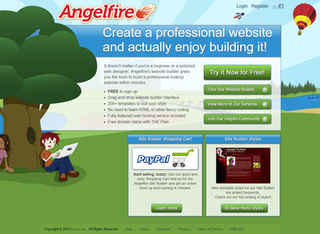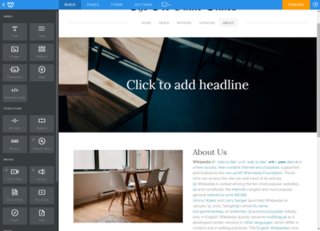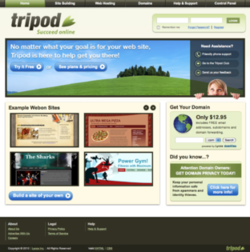
Lycos, Inc., is a web search engine and web portal established in 1994, spun out of Carnegie Mellon University. Lycos also encompasses a network of email, web hosting, social networking, and entertainment websites. The company is based in Waltham, Massachusetts, and is a subsidiary of Ybrant Digital.

A web hosting service is a type of Internet hosting service that hosts websites for clients, i.e. it offers the facilities required for them to create and maintain a site and makes it accessible on the World Wide Web. Companies providing web hosting services are sometimes called web hosts.
GeoCities, later Yahoo! GeoCities, was a web hosting service that allowed users to create and publish websites for free and to browse user-created websites by their theme or interest, active from 1994 to 2009. GeoCities was started in November 1994 by David Bohnett and John Rezner, and was named Beverly Hills Internet briefly before being renamed GeoCities. On January 28, 1999, it was acquired by Yahoo!, at which time it was reportedly the third-most visited website on the World Wide Web.

HotBot is a Canadian web search engine owned by HotBot Limited, whose key principal is Kristen Richardson. According to the website itself, the current domain has been relaunched in 2022 under new ownership and with a different technology.

Webs, formerly Freewebs, is a freemium, primarily static site-only web host founded in 2001. The service offers free and premium website hosting plans, and their own templated website building service. Unusually, Webs does not offer any dynamic content support aside from their own dynamic "apps", despite offering FTP access and allowing HTML uploads.
Pay-per-click (PPC) is an internet advertising model used to drive traffic to websites, in which an advertiser pays a publisher when the ad is clicked.

Trellix was a software company whose products allowed web users to set up personal websites with the use of online publishing tools.
An image hosting service allows individuals to upload images to an Internet website. The image host will then store the image onto its server, and show the individual different types of code to allow others to view that image. Some examples are Flickr, Imgur, and Photobucket.

Angelfire is an Internet service that offers website services. It is owned by Lycos, which also owns Tripod.com. Angelfire operates separately from Tripod.com and includes features such as blog building and a photo gallery builder. Free webpages are no longer available to new registrants and have been replaced by paid services.
Bo Peabody is an entrepreneur, venture capitalist and Internet executive who co-founded Tripod.com, one of the earliest dot-coms, in 1992. He is currently the co-founder and Executive Chairman of Seated, a dynamic pricing platform for restaurants. He is also a venture partner and entrepreneur in residence at Greycroft Partners.
Homestead Technologies is a web hosting company based in Burlington, Massachusetts.

Weebly is an American web hosting and web development company headquartered in San Francisco and is a subsidiary of Block, Inc. It was founded in 2006 by Chief Executive Officer David Rusenko, Chief Technology Officer Chris Fanini, and former Chief Product Officer Dan Veltri.
Fotki is a digital photo sharing, video sharing and media social network website and web service suite; it is one of the world's largest social networking sites. As an image hosting service, Fotki licenses photo-sharing software for global companies such as Telecom Italia, Alice.it, Sears, Mark Travel, Vegas.com, and Funjet.com, among others.
The multinational Internet corporation Yahoo! has received criticism for a variety of issues.

Jimdo is a German website-builder. The company is privately held and headquartered in Hamburg, Germany, with offices in Munich and Tokyo. Jimdo has two products, Creator and Dolphin, offering free and paid plans.

WebChat Broadcasting System, or WBS for short, is a virtual community created during the 1990s. Supported by online advertising, it was one of few services at the time to offer free integrated community services including chat rooms, message boards, and free personal web pages. Extremely popular during the mid to late 1990s in the era prior to the Dot-com bust, WBS was at that time the largest and best-known social media website on the internet. In 1998, WBS was acquired by the search engine Infoseek, which was in turn acquired by Disney/ABC. The original WebChat Broadcasting System closed on 15 September 1999 after its chat rooms were integrated into Disney's existing Go Network chat rooms. A revival of WBS was launched in 2009 and is virtually identical to the original community.
RagingBull.com is a website focused on financial literacy and day trading.
AOL Hometown was a web hosting service offered by AOL. It offered 12 megabytes of server space for AOL subscribers to publish their own websites, and included a 10-step form-driven page creator called 1-2-3 Publish and a WYSIWYG online website builder called Easy Designer, neither of which required knowledge of HTML. In 2001, AOL Hometown estimatedly had 11 million websites and a new website was added to it every eight seconds. By 2002, AOL Hometown had grown to 14 million websites. It was shut down on 31 October 2008.
Neocities is a commercial web hosting service for static pages. It offers 1 GB of storage space for free sites and no server-side scripting for both paid and free subscriptions. The service's expressed goal is to "revive the support of free web hosting of the now-defunct GeoCities". Neocities started in 2013. As of August 2023, it hosted more than 627,900 sites.








